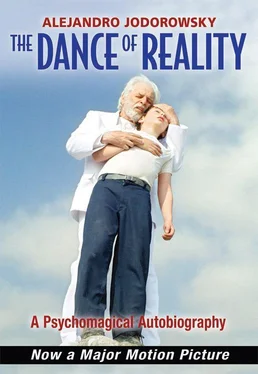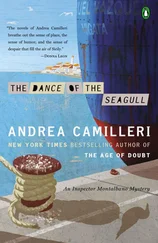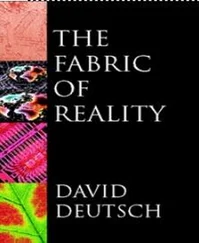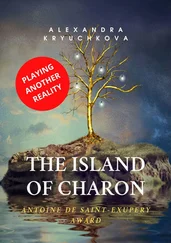Around that time, the French film Children of Paradise had come to Chile. Seeing it, I realized I had invented something that had already existed for a long time: pantomime. I immediately christened the future group Teatro Mímico and started looking for beautiful young women to join the company while at the same time satisfying my sexual needs. At first, everything went very well. But after a while, I was astonished to find that the women stopped coming, one after another. I discovered with dismay that Daniel, apparently in love with me, was driving them away out of jealousy. I asked him to explain why what began as sweet wine should so quickly turn to vinegar; I ended up expelling him from the company. Emilfork, determined to continue his life in the theater, asked the directors of the theater school at the Catholic University to grant him an audition. They agreed to his urgent request, because the fame of his talent had spread across all cultural circles.
The audition took place in the school’s small theater. There was a creaky wooden stage with burlap curtains in front of twenty seats. The directors, designers, and actors in this group were amateurs belonging to high society. They wore gray suits, ties, and their severely groomed hair shone. They told Emilfork to lie as if dead, and then, little by little, interpret the birth of life. My former friend, without giving anyone time to stop him, stripped naked and fell to the floor. He remained as he had fallen. Still, like a stone, apparently not breathing. A minute passed, then two, five, ten, fifteen, it seemed as if Daniel would stay there forever as a corpse; the examiners begun to fidget in their seats. After twenty minutes they began whispering among themselves, fearing that the actor had suffered a heart attack. They were about to get up when a slight tremor began in Emilfork’s right foot, then grew more and more and spread throughout his body. His breathing, which had been unobservable, was now growing in volume and deepening until it became the gasping of a beast. Now Daniel, as if in an epileptic fit, dragged himself into each corner of the stage, uttering deafening howls. The energy that possessed him kept on increasing, seeming limitless. With flaming eyes and an erect penis, he now began to take huge leaps, climbing up the curtains, which soon broke free of their rods. Emilfork then shook the wooden walls that surrounded the stage. They shattered into pieces. Next, with incredible strength, he began unpinning the floorboards and waving them around as weapons. Then he jumped into the audience. The honorable members of the theater school fled, squeaking like mice, leaving the deranged actor locked inside. His screams were heard throughout the building for an hour. Then they died down. There was a long silence, followed by a few discrete footsteps inside the door. They opened it, trembling. Daniel Emilfork emerged, impeccably dressed, well groomed, calm, with his usual gestures like those of a Russian prince. He looked at the group from the heights of a profound contempt. “You bunch of ninnies, you’ll never know what life is, and so you won’t know what real theater is. You don’t deserve me. I withdraw my application for admission.” And he not only left the school, but he left Chile. He moved to France, never spoke Spanish again, and lived unceasingly in the world of theater and film, enduring innumerable privations until he finally achieved fame.
We were all affected by Emilfork’s departure to France. Some of us, more than others, felt asphyxiated living in Santiago de Chile. Television was not yet fully commercialized, and one had the sensation that nothing new could happen in this city so far from Europe that was surrounded by a ring of mountains that felt like prison walls. There were always the same people, always the same streets. I knew that there were great mimes in France: Ettienne Decroux, Jean Louis Barrault, and above all, Marcel Marceau. If I wanted to improve my art I should do as Emilfork, drop everything and leave. But I had some very close ties that kept me there. First of all, there were my friends, girlfriends, and my commitments to the Teatro Mímico, which had already held some successful performances. Then there was my ambition to test the effectiveness of the poetic act on a large scale. Finally, deep down in the shadows, there was my desire to take revenge on my parents, to rub their faces in the suffering they had caused me through their lack of understanding. I discovered that rancor can be as constraining as love and entered into a foggy period during which I was unable to make decisions; a deep inertia had taken possession of my soul. I spent the days locked in my studio, reading. I excused this manner of killing time by telling myself that in order to know an author, one had to read all his works. At a forced pace I read everything by Kafka, Dostoyevsky, García Lorca, André Breton, H. G. Wells, Jack London, and oddly enough, Bernard Shaw.

First reunion. From left to right: Daniel Emilfork, Alejandro Jodorowsky, Jacques Sternberg, the incendiary anarchist Fedorov, Fernando Arrabal, Topor, Lis (Arrabal’s wife), and Toyen (surrealist painter).
One night my poet friends showed up, almost too drunk to stand, dressed in black and carrying a funeral wreath with my name on it. They lit candles and sat around me, pretending to cry while drinking even more wine. Reality was dancing again: at two in the morning, someone knocked frantically on the door. We opened it. My father walked in barefoot, waving a lamp.
“Alejandro, our house burned down!”
“The Matucana house?”
“Yes, my house, your house, with the furniture, clothes, Raquel’s piano, everything!”
“Oh, my writing!”
“Fuck your writing! You’re thinking about some filthy sheets of paper and not my money that I kept in the shoe box in the closet, my stamp albums, twenty years’ worth of collecting, my cycling shoes, the porcelain your mother kept since we got married, you don’t have a heart, you don’t have anything, I don’t know who you are, we thought we’d come to sleep here, but this is a nest of drunks, we’ll go to a hotel!”
And he grunted in exasperation while the poets, elated with the news, danced around. We took up a collection to rent three victorias. We made the journey to Matucana. The weary steps of the horses gave a metallic voice to the dying night. We improvised elegies to the burned house over the rhythm of the horseshoes.
When we arrived, the fire was out. No one was there. Sandwiched between two ugly concrete buildings, my old home slept like a black bird. The poets got out of the carriages and danced in front of the remains, celebrating the end of one world and the rebirth of another. They dug through the rubble in search of the red worm into which the phoenix would have transformed itself. They found nothing but my mother’s blackened corset. Ah, poor Sara Felicidad! After all those years without exercise, spending ten hours a day behind the shop counter to the point that her elbows were covered with calluses from so much leaning on that hard surface, and also eating compulsively to compensate for the lack of love in her life, she had grown fat, lost her figure, and felt as if she was drowning beneath a magma of flesh, while my father, under the pretext of door-to-door sales, had become the “neighborhood Casanova,” riding his bicycle around, committing adultery left and right with female customers. In order to set herself limits that would reassure her that she was alive, that the world was governed by infallible laws, that she was not open like a river to the thirsty snout of any rapacious beast that might arrive, Sara had donned this corset, constructed of steel rods, which encased her from breasts to midthigh. The first thing she did when she awoke in the morning was to shout for the maid, who came grumbling as usual to help her to tie its laces. She exited her bedroom rigid but with form, her animal nature compressed, a self-confident lady feeling no shyness in front of the scrutinizing gaze of others. At night, returning from the shop with swollen feet and eyes reddened by the neon lights, she would again call the maid to help her out of this instrument of torture. This was done at a time when we should all have been in bed. I always knew that I would not be able to fall asleep immediately. My mother would begin scratching herself with her long fingernails, which were always painted red. Her skin, dry after so many hours of confinement because the canvas fabric of the corset prevented her from sweating, made an insidious, pervasive sound like paper ripping. The concert would last for half an hour. I knew from the maid’s gossiping that Sara soothed her itching from her neck to her knees by smearing herself with her own saliva. Her obesity, her elbow calluses, her swollen feet, her itching, were things that I always viewed with a kind of sarcasm, as if my mother were guilty of this ugliness, an ugliness that she had to hide in a corset. Now, watching the poets kicking around this blackened framework and giggling, I felt sad for her — poor woman, naively sacrificing her life simply due to lack of awareness. Her myopic husband, mother, stepfather, half-siblings, and cousins had been unable to see her glorious whiteness of body and soul. Punished as a child, considered an intruder even before her birth, given birth to apathetically, received into a cold cradle, she was a swan among proud ducks.
Читать дальше













